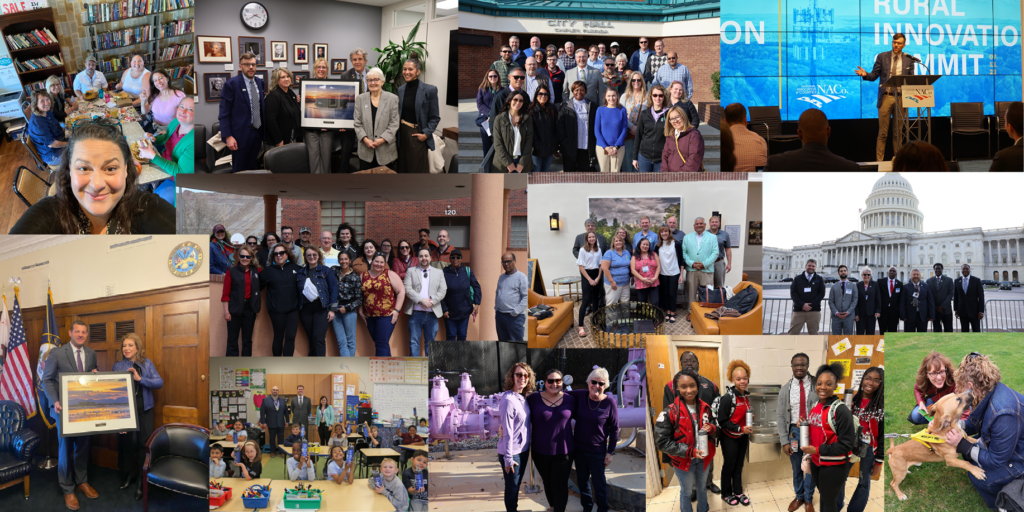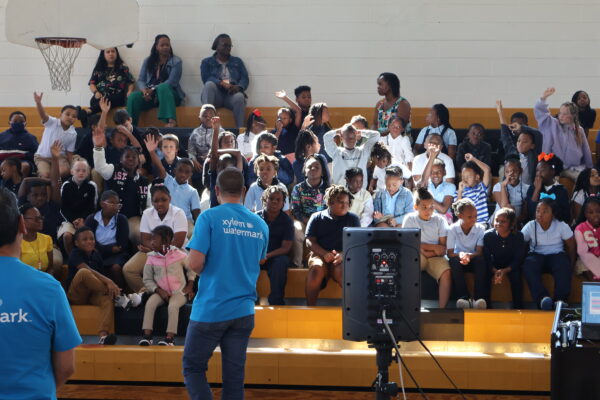Annual Impact Report Showcases RCAP’s Fifty Years of Rural Service, Impact, and Innovation

FY2023 review demonstrates the difference that RCAP’s more than 350 technical assistance providers and strong relationships with federal partners have on communities across the U.S.
WASHINGTON, D.C. (June 24, 2024) – The Rural Community Assistance (RCAP) released its Annual Impact Report highlighting the accomplishments and expansion the organization experienced in Fiscal Year 2023 as it was awarded record funding and began new partnerships with federal agencies and other key organizations. RCAP also celebrated its 50th birthday which provided the opportunity to reflect on a half century of improving the quality of life in rural America, rooted in drinking water and sanitation, and to chart a course for what the network can accomplish over the next 50 years.
RCAP helped 2,153 communities leverage more than $440 million in federal funding in all 50 states and five U.S. territories, serving 3.1 million rural and Tribal residents, over one million of whom were people of color. The network’s training and capacity building programs provided 568 workshops to 12,682 attendees representing over 6,600 systems. Additionally, RCAP served almost half of all persistent poverty counties (PPCs) in the U.S.
The organization had programmatic successes in serving public drinking water systems, private wells, conducting rural leadership institute for water pilots, and in accelerating rural entrepreneurship.
The EPA Rural, Small and Tribal (RST) Treatment Works program encompassed technical assistance (TA) and training via 183 projects in 49 states and 5 territories, and RCAP also supported six Closing America’s Wastewater Access Gap decentralized pilots. RCAP is looking forward to supporting hundreds more small, rural, and Tribal communities through the second round of Treatment Works funding totaling $15 million, which launched at the start of FY2024 and is divided into five topical priority areas: Funding & Finance; Water Quality & Compliance; Tribal; Decentralized; and Lagoons.
As one of EPA’s four national Environmental Finance Centers (EFCs), RCAP is working to ensure disadvantaged communities who need it most can access the influx of federal infrastructure dollars over the next five years, most specifically from the Bipartisan Infrastructure Law (BIL) via the Drinking Water and Clean Water State Revolving Loan Funds (SRFs). RCAP’s EFC program began on May 1, 2023 with a focus to onboard projects in small, rural, and Tribal communities and help them to apply for SRF funding to improve infrastructure and public and environmental health in their communities.
As a new national EFC, RCAP is also working closely with the University of California-Los Angeles (UCLA) Luskin Center for Innovation and University of Illinois State Water Survey to provide research to support TA and policy efforts. In April 2023, RCAP collaborated with the UCLA Luskin Center for Innovation to publish a report titled “ Considerations for a National Drinking Water Quality Compliance Assessment ” (funded by the Water Foundation). This report is a roadmap for what the first national assessment of drinking water quality compliance can and should look like and provided inspiration for the research projects RCAP is actively working with these partners on.
RCAP has been actively engaged with Congress and administration, including pressing for passage of the Farm Bill with a robust Rural Development title, including supporting $200 million in mandatory funding for water and community facilities programs as well as funding for expanded TA for water cybersecurity and disaster recovery. RCAP CEO Olga , who concluded her first year leading the nationwide network, also worked with regional partner Rural Community Assistance Corporation (RCAC), the Thornburg Foundation, and state lawmakers in New Mexico to pass the Regional Water Systems Resiliency Act. This legislative framework enables utilities to collaborate on regional solutions that will eventually lead to community resiliency and sustainability.
RCAP’s research team partnered with the Organisation for Economic Co-Operation and Development (OECD), an international, intergovernmental organization, on research on rural innovation. Economic Development Administration (EDA) funding enabled the partnership to research rural innovation and highlight three case studies in the U.S. The project looks at what rural innovation means, how it’s different than traditional ideas of innovation in non-rural places, and makes recommendations for how government can encourage and support rural innovation. The report was released in November 2023.
RCAP continued its collaboration with the Pacific Institute and the Livelihoods Knowledge Exchange Network (LiKEN) on research at the intersection of water, climate, and equity, seeking to co-produce knowledge, materials, and publications which would improve understanding of climate realities faced by frontline communities and their water systems and provide helpful outputs to empower and assist them in building more resilient water systems.
RCAP has also embarked on a new strategic plan, moving beyond the “horizontal,” underground infrastructure of rural communities to include more of the “vertical,” or, “human” infrastructure needs RCAP has seen in rural communities to help them become sustainable and resilient. The focus of this new plan is the concept of Community-Led Rural Development (CLRD), which will take RCAP beyond its traditional focus on water, wastewater, and solid waste to now include workforce, disaster and climate resiliency, broadband, regionalization, leadership and capacity development, and community facilities. RCAP plans to focus on these six areas for at least the first two years of the five-year strategic plan.
# # #
About RCAP
RCAP is a national non-profit network providing opportunity, assistance, and practical guidance to small communities in all fifty states, the U.S. territories, and on Tribal lands to ensure access to safe drinking water, sanitary waste disposal, and economic prosperity for rural America. RCAP and its more than 350 technical assistance providers work together with rural communities and partners across the country to elevate rural voices and build long-term local capacity to improve quality of life, starting at the tap.
Media Contact:
Seth Johnson
Senior Communications Manager
[email protected]

